The Burundian government accuses the European Union of attempting to change the regime in Burundi. The EU denounces the accusations saying they are false.
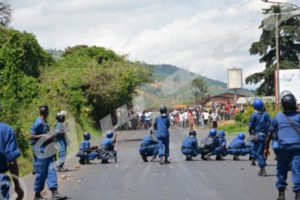
Demonstrations in Bujumbura against another candidacy of Pierre Nkurunziza for the 2015 elections
The accusations made in this communiqué issued on June 5 are serious. Bujumbura accuses the EU delegation of not only being involved in sabotaging the 2015 electoral process but also fueling the desire to operate a regime change in Burundi.
The Government indicates that it will even analyze in depth the likely influences that the European Union policy against Burundi would have exerted in the making of some decisions.
According to the government in place, the European Union has provided funding to natural or legal persons involved in the destabilization of the Republic of Burundi. “These people are currently under an international arrest warrant issued by the Burundian judiciary,” said Secretary-General and Government spokesman, Philippe Nzobonariba, who read the statement.
The evidence put forward by the Burundian government is a document circulating on the Internet. it shows contracts between the European Union and the international NGO War Child in 2014. The document shows that the European organization financed at the time the evacuation of several human rights defenders or their families from Burundi.
The European Union rejects the allegations
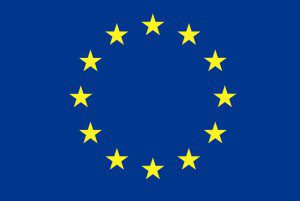
The European Union backs a program for supporting human rights defenders.
The EU denied these accusations on Wednesday. They described the accusations of destabilizing Burundi as false. “We formally refute these accusations. They are based on a deliberately wrong interpretation of a program of support for human rights defenders.”
The EU delegation said the EU foreign policy is based on the promotion of human rights and the protection of their defenders throughout the world. “Any lasting settlement of the crisis in Burundi must take into account the ongoing and past human rights violations and the protection of the people and organizations working in this regard”.
The EU delegation also emphasized that the EU is a long-standing partner of the Republic of Burundi and its people. It supports the mediation efforts of the East African Community and continues its development cooperation in direct support to the Burundian population.
Burundi is under sanctions taken by the EU since March 2016. The European organization, whose aid accounted for 20% of the budget, decided to freeze the direct aid allocated to the Burundian government. The European Union wielded the Cotonou Agreement to demand its respect by Bujumbura. The agreement was signed by African states, including Burundi on the one hand, and the European Union on the other hand. Article 96 stipulates that the parties undertake to respect democratic principles, human rights and the rule of law.
Wolfram Vetter, Head of the European delegation, has so far indicated that conditions have not yet been met to resume giving budget support to the Government of Burundi as human rights violations, cases of torture and disappearances continue to be reported.
He also mentioned the reduction of the media space and that of civil society.
>>Reactions
War Child Holland
Peter Schouten, War Child Holland Spokesman, said that there were indeed contracts signed by the European Union, represented by the European Commission, and War Child Holland. “We ended these contracts in 2015 immediately after the headquarters of our organization concluded that they were not within our mandate in Burundi.
Peter Schouten says these contracts with the European Union have thus ended. At this moment, War Child’s first interest is in the well-being of children in Burundi. “They are Burundi’s bright future and War Child wants to help them by providing psychosocial support, protection and education to them.”
Pacifique Nininahazwe: “I have benefited from the ‘Protect Defenders”
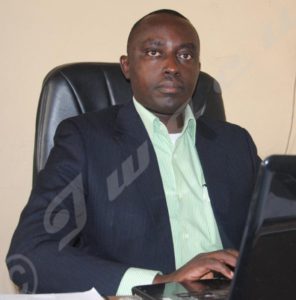 This human rights activist indicates that there is a UN declaration on human rights defenders, since 1998 adopted by the General Assembly, in the presence of Burundi. The EU has recently adopted a very important program: the “Protect Defenders”, which also exists in countries such as the United States of America and Ireland. This program is public and provides for evacuation in case of people whose lives are very much in danger. According to Pacifique Nininahazwe, in December 2014, his family was evacuated when it learned of an imminent attack against it. “I had just toured Brussels at the EU, Geneva at the United Nations and Sweden. Everywhere I went, I had a firm speech against the third term of Nkurunziza. “He says several organizations have made statements about his safety. The United Nations Special Rapporteur on human rights, Michel Forst, alerted the authorities and diplomats. Two policemen were assigned to his home. It is normal that the mechanisms of protection of human rights defenders have worked in my favor in this situation. According to Pacifique Nininahazwe, the government’s statement rather confirms the importance of this kind of mechanisms for protecting human rights defenders. “I feel that the authorities regret that I did not die in December 2014.” I am pleased that many other Burundi human rights defenders, including journalists, have also benefited from the protection of these mechanisms. “
This human rights activist indicates that there is a UN declaration on human rights defenders, since 1998 adopted by the General Assembly, in the presence of Burundi. The EU has recently adopted a very important program: the “Protect Defenders”, which also exists in countries such as the United States of America and Ireland. This program is public and provides for evacuation in case of people whose lives are very much in danger. According to Pacifique Nininahazwe, in December 2014, his family was evacuated when it learned of an imminent attack against it. “I had just toured Brussels at the EU, Geneva at the United Nations and Sweden. Everywhere I went, I had a firm speech against the third term of Nkurunziza. “He says several organizations have made statements about his safety. The United Nations Special Rapporteur on human rights, Michel Forst, alerted the authorities and diplomats. Two policemen were assigned to his home. It is normal that the mechanisms of protection of human rights defenders have worked in my favor in this situation. According to Pacifique Nininahazwe, the government’s statement rather confirms the importance of this kind of mechanisms for protecting human rights defenders. “I feel that the authorities regret that I did not die in December 2014.” I am pleased that many other Burundi human rights defenders, including journalists, have also benefited from the protection of these mechanisms. “

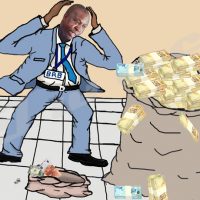
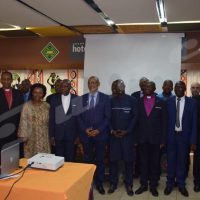
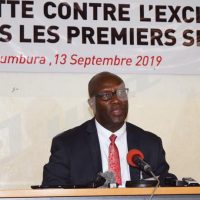
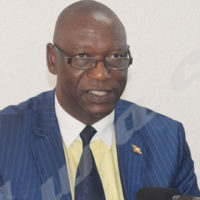
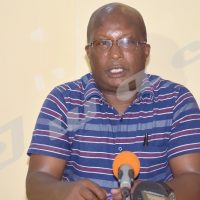













 IWACU Open Data
IWACU Open Data

